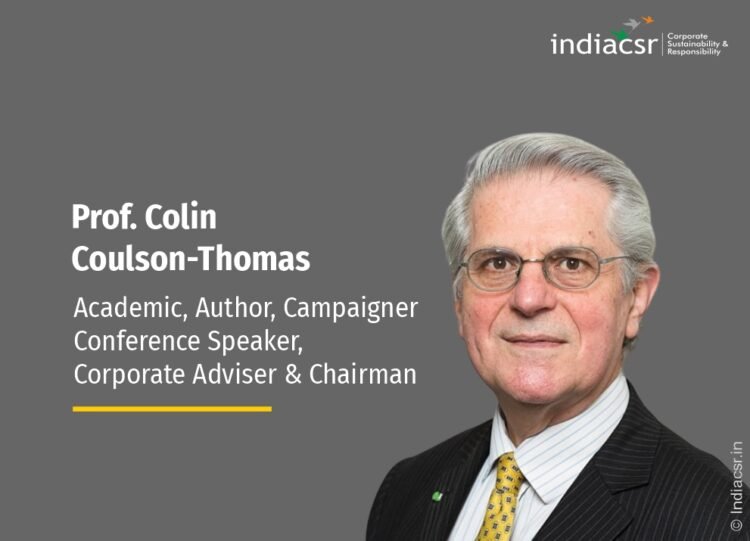By Prof. Colin Coulson-Thomas*
Boards need to monitor what is happening in the international market environment and take effective steps to remain relevant and current. The theme of this year’s London Global Convention on Corporate Governance and Sustainability convention is the board’s evolving role in an uncertain global economy, which raises important issues for board chairs.
Global Perspective and Flexibility
Are your directors primarily, or exclusively, drawn from the country in which your company is incorporated and/or where its head office is located? How global is your board in terms of its awareness and perspective? In today’s world international awareness and perspective can be more important than nationality.
Given the uncertainty in the international marketplace, how flexible are your board and corporate processes? How might greater flexibility be introduced into your company’s infrastructure, estate, contracts and relationships?
Adaptation and Planning
How could you speed up responses? How might evolution and adaptation be built into how your company operates, is structured and is governed? In rapidly changing contexts, are you planning or intelligently steering your company?
Greater uncertainty has many implications: for the questions we ask; for policy making; for what we delegate and to whom; and for how decisions are made. When new situations arise, we may not have an agreed position. We may not know trusted experts to whom we can turn for counsel.
Collaborative Responses and Strategic Relationships
Uncertainty is challenging, but we need a sense of perspective. Collaborative responses to uncertainty can create closer and more strategic relationships with customers, suppliers and business partners. Uncertainty has always been a fact of life for many – if not most – entrepreneurs. We are constantly told that markets don’t like uncertainty. When there is uncertainty cautious and risk averse boards put their investment plans on hold.
More adventurous, courageous and entrepreneurial spirits respond differently. They are often both more resilient and more willing to be proactive. During periods of uncertainty, they gain competitive advantage, grow market share and develop first mover leads while others hold back.
Embracing Opportunity
Opportunity could be another word for uncertainty. Our challenging business environment offers unprecedented opportunities.
Whether your organisation is a large and listed corporation, a family business or a small or social enterprise, many directors are already confronting uncertainty and striving to build a better tomorrow. Appropriately, the topic for this session is enhancing the effectiveness of tomorrow’s boards.
Proactive Board Composition and Governance
The extent to which your board is fearful, reactive and defensive rather confident, proactive and innovative should raise questions about the steps required to enhance the effectiveness of your board.
Were existing directors appointed because of their past achievements and experiences in yesterday’s world, or their openness to future possibilities? At board meetings do they contribute war stories of what they did when your company had a different business model?
Forward-Thinking Strategies
Are directors providing challenge and asking the right questions? Are they trying to improve and/or protect what exists, or create new and better alternatives? How do they relate to generation Z?
Where will tomorrow’s directors come from and how will they be prepared for their boardroom roles? What contributions will you expect from them? Taking a cue from Rt. Hon. Theresa May MP, the UK Prime Minister, will there be customers and employees on your boards? If so, how will they be selected and how will you handle conflicts of interest when matters affecting customers and employees are discussed?
Evolving Board Dynamics
Crucially, will there be greater diversity of thinking on tomorrow’s corporate boards? What will they look like? Will their remit and how they operate change?
What form will future board meetings take? Will existing agendas, annual calendars of business and practices still be relevant?
Will monthly board meetings survive? When operations are 24/7, significant issues and narrow windows of opportunity can arise at any time. Could waiting for the next board meeting be viewed as an archaic and dangerous practice?
Agile Decision-Making and Engagement
Greater connectivity and speed of response is increasing the number of decisions that have to be quickly made. Deciding how and when to act can be as important as determining what to do.
Will a structure of permanent board committees give way to networks, communities and project groups? New rules of engagement may be required, covering both directors and those who advise them. Who needs to be engaged, by what means and when?
Governance in Flux
What will tomorrow’s company look like? To whom should it be accountable? As more companies transition to flexible and responsive portfolios of projects and mutating networks of collaborative relationships I advocated in my 1992 book Transforming the Company, how will they be governed?
Does corporate governance need to become more open and democratic? Should it involve more people? Should a wider range of inputs be sought when visioning and other exercises are undertaken?
Will company law, the activities of regulators and governance practices keep pace with the consequences of greater use of crowd funding, sharing, bartering and non-monetary exchange?
Tailored Governance Approaches
Board effectiveness and performance can depend upon the context, stakeholder requirements, ambitions, the stage of development of a business and the nature of the issues and opportunities it faces. Can the current degree of relative uniformity in governance practices survive?
Should different companies, subsidiaries, business units and strategic projects be governed and managed in quite different ways, according to their situation and circumstances? Might a variety of approaches to control and compliance be required?
Shifting Benchmarks and Expectations
In a world of greater diversity, rapid change and periodic adoption of new business models, who do we benchmark against?
Tomorrow’s boards will reflect decisions we take today. For new board members, do you look in familiar places or cast the net more widely? Predicting the specific experience, expertise, qualifications and track record that may be relevant in future scenarios is not easy, but integrity and personal qualities may become even more important than they are today.
Nurturing Resilience and Innovation
We need directors who can handle turbulence and uncertainty. They have to assess risks, make choices and take decisions in shifting situations, where data may be suspect and probabilities are changing. We need people who instinctively do the right things.
The rarefied atmosphere of corporate head offices can lead to over-sophistication. Faced with uncertainty, some people hide behind prison bars of their own creation. They are so concerned with avoiding risks and compliance that they loose the courage to be entrepreneurial and to have a go.
Selecting for Adaptability
When making board appointments, be wary of candidates who have effortlessly advanced in a period of greater stability and certainty than we have today. How resilient will they be when tested? In crisis situations, some people surprise us and rise to the occasion, while others disappoint.
Don’t overlook the latent potential of your existing team. Finding what we need within ourselves rather than looking for what might not exist is a key message from a classic 1939 film, The Wizard of Oz.
Cultivating Intrinsic Qualities
Transported to the land of Oz, young Dorothy set out on an uncertain and potentially dangerous journey with three companions: a tin man with a hard shell who felt he needed compassion and wanted a heart; a cowardly lion who wanted courage; a scarecrow who wanted a brain so that he could think.
Dorothy and her companions faced a succession of challenges, but they stayed together. They found within themselves the compassion, courage and thinking required to cope with adversity and overcome obstacles. How tomorrow’s boards will cope and be perceived will depend critically upon the extent to which future directors possess these and other personal qualities.
Renewal and Reinvention
While new blood on a board can be welcome, where there is humility and self-awareness there is the possibility of renewal, reinvention and reinvigoration.
Understanding and addressing the deficiencies within your existing directors and board might enable you to identify, release and/or develop what you require to confront and exploit uncertainty. It may allow you to build a positive and resilient team of ‘bouncing balls’ who can repeatedly recover and move forward.
About the Author:
Prof. Colin Coulson-Thomas, an experienced director, leads the International Governance Initiative of the Order of St Lazarus, is Director-General, IOD India, UK and Europe, and advises boards. He is also Chancellor and a Professorial Fellow of the School for the Creative Arts, Chairman of the Audit and Risk Committee of United Learning and a member of the advisory board of Bridges of Sports. He has helped directors in over 40 countries to improve director, board and corporate performance. Author of over 60 books and reports he has held professorial appointments in Europe, North and South America, the Middle East, India and China. Colin was educated at the LSE, London Business School, UNISA and the Universities of Aston, Chicago and Southern California. He is a fellow of seven chartered bodies.
You may also like:
- India CSR Honours Prof. Colin Coulson-Thomas honored with India CSR Lifetime Achievement Award
- Leadership and entrepreneurship are about thinking as well as doing: Prof. Colin Coulson-Thomas
- Threats and challenges have been an ever present feature of the human experience: Prof. Colin Coulson-Thomas
- People and organisations should aim high: Prof. Colin Coulson-Thomas
- Enterprise Risk Management: Board Perspectives (Questioning Risk Management): Prof. Colin Coulson-Thomas























